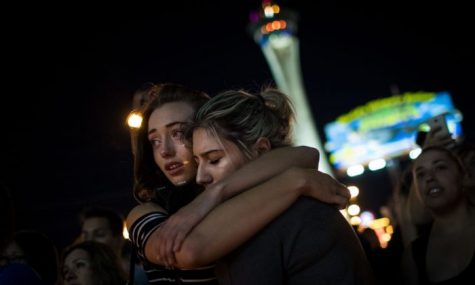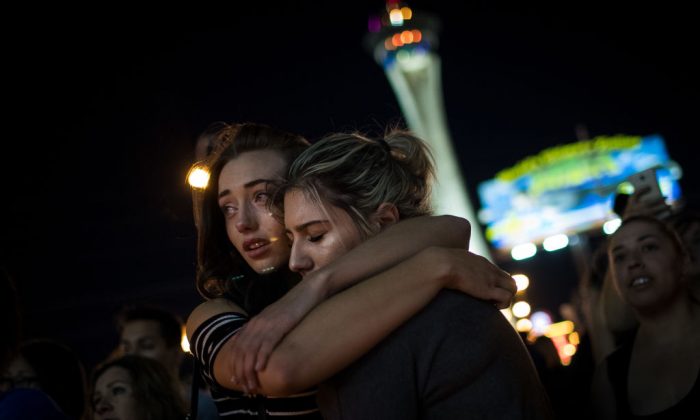“What happens now?” The big question following Las Vegas shooting
October 12, 2017

From Virginia Tech to Texas Tech, college campuses have been homes to some of the worst mass murders in American history. Monday night’s fatal shooting of a police officer at Texas Tech University is no different.
Unfortunately, the actions of Steven Paddock have also left the country in utter disbelief. Following the Las Vegas shooting tragedy, a reaction from campuses and other public institutes needs to happen, and fast.
College of Dupage Police Chief Joseph Mullin is confident in the department’s ability in keeping this campus safe, saying “The COD Police participate in regular training related to the response to an active threat.”
“The COD Police maintain a high level of vigilance and situational awareness in their daily operations. This includes awareness, and recognition of, pre-incident behaviors associated with active violence. The COD Police will continue to work with community members to prevent, mitigate, and respond to active violence.”
“The COD Police offer monthly Active Violence Preparedness classes to faculty and staff members who will provide leadership in the event of a crisis.
Mullins also said that CODPD “intend to make Active Violence Preparedness classes available to students in the very near future.”
Although carrying any kind of weapon or firearm on campus is strictly prohibited, COD currently offers a “Concealed Carry with Confidence” class available to those who meet the given requirements.
According to the college’s policy manual section 15-41, “The possession and/or use of weapons is strictly prohibited on College of DuPage premises unless possession or use is by an authorized current or retired law enforcement officer or officers engaged in official duties.”
“Any employee or student not authorized by the President to possess a weapon while on College of DuPage premises may face disciplinary action, up to and including termination or expulsion, consistent with College policy and College collective bargaining agreement obligations.”
It also explains that CODPD “shall be responsible for the development and promulgation of procedures and protocols for storage and confiscation of weapons and firearms.”
Rest assured, Mullins further stated that COD “has a comprehensive emergency operations plan specific to active violence, which includes mutual aid agreements with other local law enforcement and medical partners.”
“This plan outlines strategies to prevent, mitigate, respond to, and recover from active violence. The COD Police are represented and serve on the College’s BIT (Behavior Intervention Team). One of this team’s objectives is to mitigate the potential for active violence.”
The awakening news of Steven Paddock’s potential stay at the Blackstone Hotel during Lollapalooza has also shortened some people’s breath.
It is still unclear why Steven Paddock hadn’t checked in to his hotel the weekend of Aug. 3, in Chicago. A frightening reality most concert-goers will have to cope with for the rest of their lives. With the growing in popularity Kidzapalooza and estimated population of five times that of the Route 91 Harvest Festival, disaster would’ve been inevitable.
COD student Nick Fancher, 22, said, “Many of us take each day of our lives for granted not realizing tomorrow is never promised. Seeing all of the innocent lives injured and lost during the Las Vegas massacre strongly highlights how valuable life truly is.”
“This had strong implications on myself,” Fancher said after hearing Paddock had booked a room at the Blackstone Hotel. “Being a part of the millions of people and comprehending that I could easily have been a victim along with the others.
“These kinds of horrific experiences allow me to realize the importance of life and how this can happen to anybody at anytime. It is sad to think that our lives can be taken in such an unfortunate way but having a positive outlook on life can help us move forward from these circumstances.”
According to Campus Safety, since 2012 there have been 142 school shootings in the United States, leaving 290 students and 40 faculty members dead.



















Joe • Oct 13, 2017 at 8:55 am
Since nothing besides ‘thoughts and prayers’ happened after Sandy Hook, I’m guessing that nothing will happen after this one. If children being massacred at school with guns that were obtained legally doesn’t do the trick, nothing will.